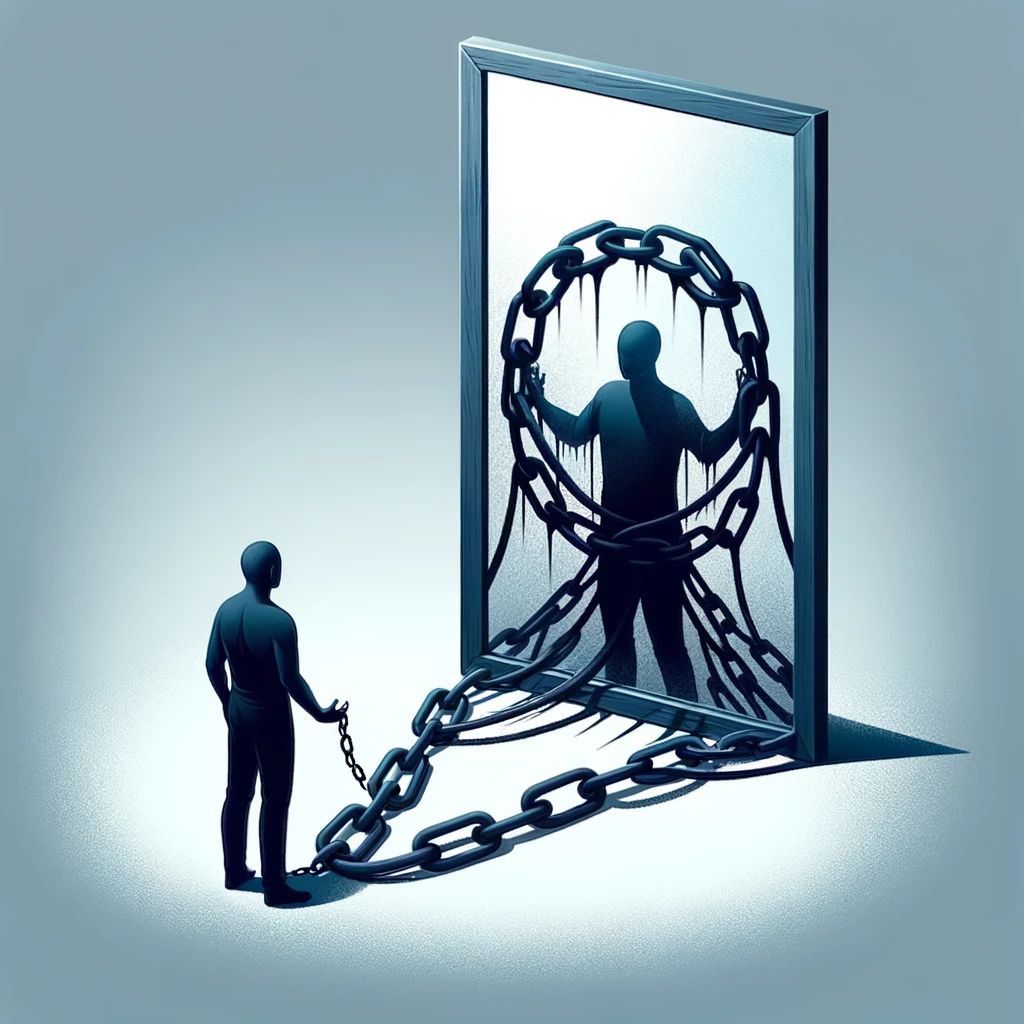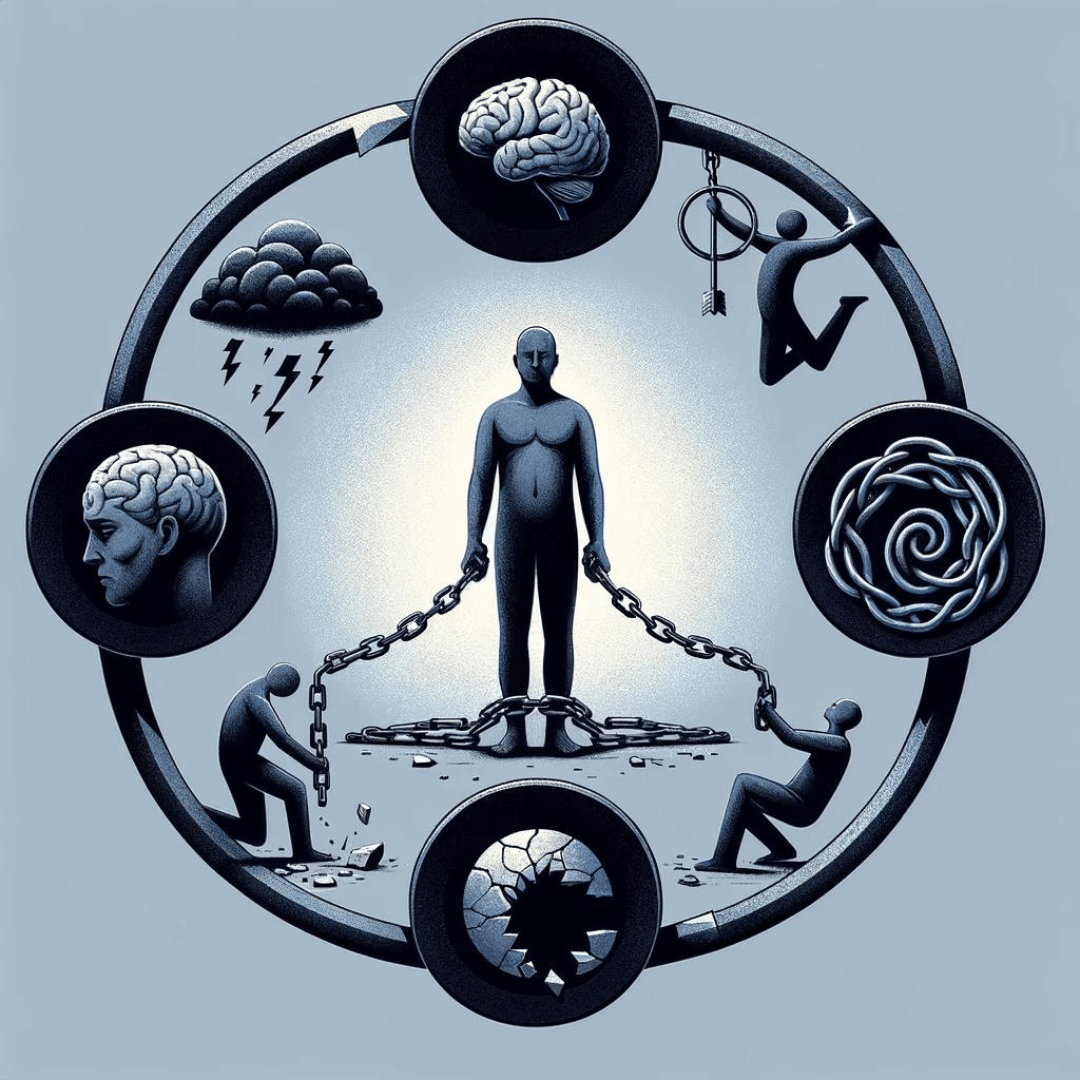- EDDSPIRE
- Posts
- Your Unconscious Self-Sabotaging Identity is Ruining Your Life - The Growth Paradox
Your Unconscious Self-Sabotaging Identity is Ruining Your Life - The Growth Paradox
Self-sabotaging behaviors, even when harmful, can be familiar and comforting.
I used to identify myself as occasionally being lazy. But my laziness always followed a pattern. When I was close to getting the work done, it hit. I had a good excuse too.
"I'm almost done. I have enough time. I worked hard. I can afford to take a short break."
The problem? That short break was turning into days. Sometimes even weeks.
Over time, I built this unconscious self-identity. I unknowingly embraced an identity of laziness. And the worst part? It was controlling my life.
I was fooled into believing it.
But what I thought was laziness turned out to be a pattern of self-sabotage. And I was adopting this identity...

Adopting an Unconscious Self-Sabotaging Identity
Adopting your self-sabotaging behavior as part of your identity is a dangerous road.
For a long time, the lack of self-awareness made me blind. My identity wasn't mine. A set of learned behaviors, rooted in my childhood trauma, dictated who I am.
We have all experienced childhood trauma in some form or another. It's a big part of us, whether we see it or not.
But not all trauma is bad.
Good trauma can spark growth. For example, being poor can fuel your drive to succeed. Losing a loved one can make you cherish life more. We call this "post-traumatic growth."
Unfortunately, not every tough experience turns out positively.
Some experiences deeply hurt us. They leave us with deep unconscious needs, fed by self-sabotaging behaviors.
Funny enough, my eye-opener came during a focused procrastination session on Instagram. A video about self-sabotage grabbed my attention. It led me into this rabbit hole about self-sabotaging. It sparked my curiosity, and I started researching the topic. This exploration opened up a new perspective and changed my life forever.
Understanding my self-sabotage led me to a deeper question: What drives this behavior?
In reality, self-sabotage is simply the presence of an unconscious need that is being fulfilled by the self-sabotaging behavior."
How does that relate to me being lazy? What's this mysterious unconscious need? Why do I need to fulfill it? And how do I do that?
Lots of questions and barely any answers, but I was onto something.
I was right.
No, I was not lazy. I was delaying tasks to protect myself from the uncomfortable fear of failure.
The unconscious mind was associating my fear of failure with a primal threat to my well-being. The "monkey brain" wanted to feel safe. And the "monkey self-awareness" couldn't see that far.
My mind perceived an important goal —something that brings fulfillment— as a danger to my survival.
Flooded by concepts I could not understand, it took time. But it clicked.
Failure has always scared me. After so many setbacks in my life, I thought I had it all figured out. I was mistaken. My fear of failure kept feeding my self-sabotaging behavior, making me fail. Every time.
It's a self-fulfilling prophecy.
The fear of failure triggers behaviors that ensure failure. It makes you fail every time you attempt something. It's a psychological pattern. The fear of a negative outcome results in actions that make that outcome more likely. This cycle reinforces the belief that you are bound to fail.

A self-sabotaging cycle
Unconsciously ruining the progress made towards your goals is the real enemy. A vicious, never-ending cycle of failures with unknown causes.
This translated into many parts of my life.
Not being able to express my emotions
Lack of confidence in some aspects of life
Self-control
Overspending
Accused of being "a cold person"
And more...
It took some time, but I've realized:
No, you are not lazy. You are unconsciously avoiding stress to fulfill your need to relax.
No, you are not a cold person. You are unconsciously protecting yourself from getting hurt as a result of past experiences where expressing emotions led to negative outcomes.
No, you don’t lack self-control. You are seeking comfort and attempting to fulfill an emotional need through alcohol.
No, you don’t overspend. You are trying to fill a void by seeking temporary happiness and validation.
No, you are not unsociable. You are protecting yourself against rejection and judgment to fulfill the need for emotional safety.
No, you don’t lack confidence. You are just looking for external validation to reassure your worth. It comes from past experiences of criticism or a fear of not being good enough.
Getting to the root cause is hard work. It requires self-awareness, critical thinking, deep introspection, and connecting life patterns.
Overcoming how you think about yourself is the real, difficult thing.
“When you habituate yourself to do things that move your life forward, you call them skills. When they hold your life back, you call them self-sabotage. They are both essentially the same function. “
Why do we tend to integrate our self-sabotaging behaviors into our identity faster than our skills?
The simple answer is Comfort in Familiarity.
Have you ever noticed yourself avoiding new challenges because they felt too uncertain? I did. Lots of times.
Avoiding new opportunities
Not pursuing passions
Staying in unhealthy relationships
Procrastination
They offer comfort. A path that leads only to regrets.
But why do you think that happens?
The human brain hates stepping into the unknown. Self-sabotaging behaviors, even when harmful, can be familiar and comforting. I call this The Growth Paradox.
Change is hard. Growth is uncertain. Our brain hates it.
Moving away from your self-sabotaging identity requires confronting yourself. Redefining your whole worldview. Forgetting who you are. But it's necessary.
Defeat The Growth Paradox With My "STEP Forward" Framework
S - Self Awareness
Simply put, self-awareness means noticing your own thoughts and feelings. It's an important factor in how you think, act, and react to our thoughts, feelings, and actions. You have 2 types of self-awareness: internal & external. They are independent of each other.
Internal self-awareness is about understanding your values and recognizing your strengths and weaknesses. External self-awareness involves knowing how others see you.
Why is this important?
To recognize when and why you're engaging in self-sabotaging behaviors.
How to cultivate self-awareness?
Reflect on your thoughts, behaviors, and feelings every single day. Process your thoughts through writing and journal your inner states. Practice mindfulness and meditation.
T - Trigger
You can't identify the trigger without a certain degree of self-awareness. Think of a trigger like a button on your remote. When pressed, the button automatically plays a specific movie. The movie is your automatic emotional response. Just as each button is designed to play a specific movie, each trigger you have is linked to a specific emotional response. Identifying your trigger is like understanding which button was pressed to start the movie. It gives you the chance to change the programming.
How to identify your triggers?
Reflect on Past Incidents. Think back to moments when you felt overwhelmed, anxious, or found yourself going back to self-sabotaging behaviors. Note what happened just before these feelings or actions. Self-reflect. Take your time.
E - Experimentation
Once you've identified your triggers, it's time to act. You need to learn through experiences that change is manageable. The monkey brain needs to learn that failure is not a primal threat to your well-being. It's a stepping stone for growth.
How do you experiment?
Start with small, manageable changes to your behavior in response to identified triggers. For example, if fear of failure is a trigger, set a small goal outside your comfort zone. If fear of judgment is a trigger, go out in flip-flops and shorts.
P - Persistence
Understand that growth is a long process. Overcoming your unconscious self-sabotaging identity, which you've been building for years, takes time. Growth requires commitment. It requires persistence in the face of challenges.
Your setbacks are a part of the journey. They are not the reason to revert to self-sabotage.
FORWARD
Reflect on your progress as often as possible. (I do it daily, weekly, monthly, quarterly, and yearly using my Free Smart Planner). Always celebrate small wins to reinforce positive change. Set clear goals and maintain momentum in your personal growth. Push beyond your comfort zone and permanently move past "The Growth Paradox."